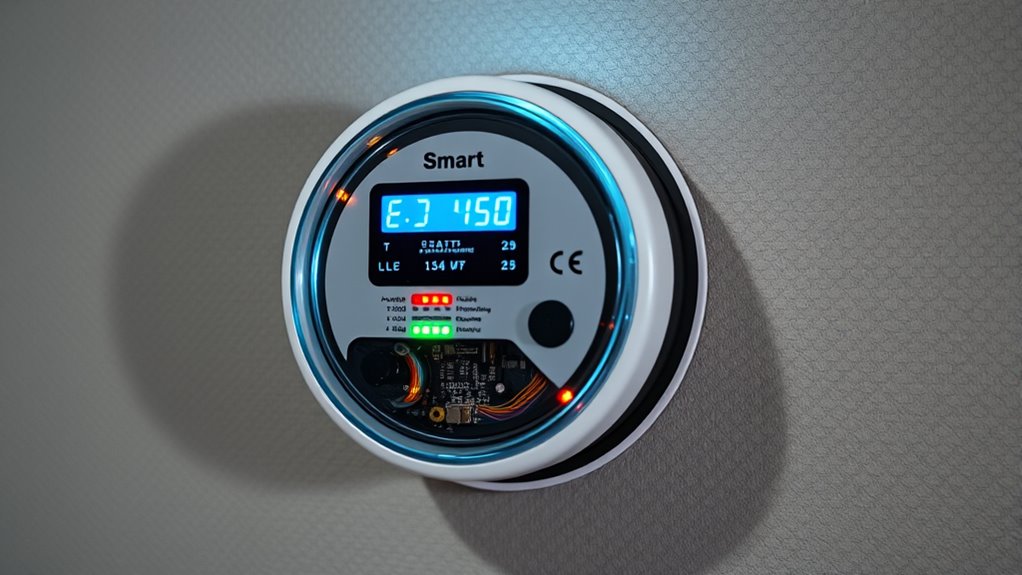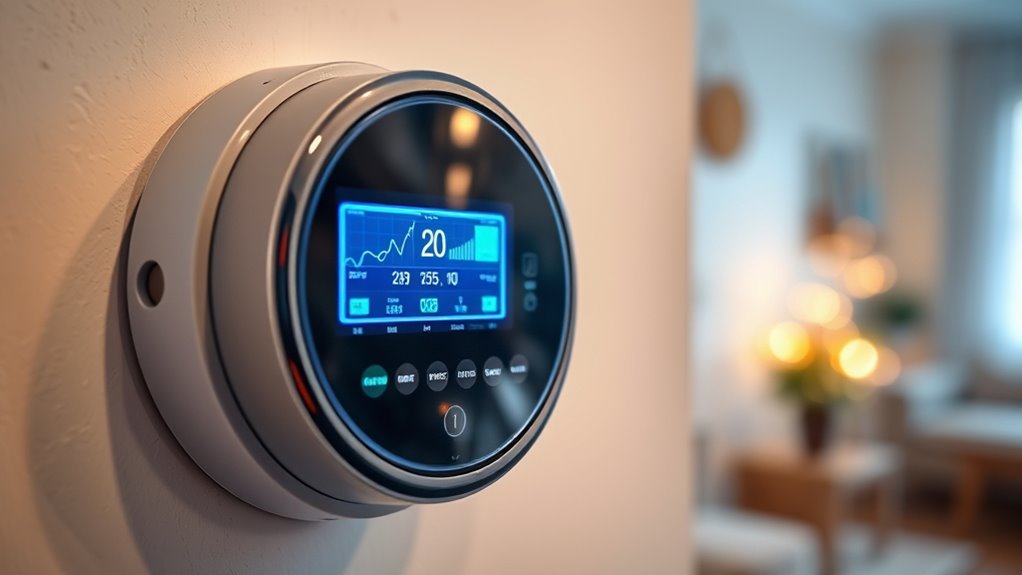Smart meter data gives your utility detailed insights into your daily routines and energy habits, such as when you turn lights on or off. This information can reveal if you’re home, sleeping, or away, raising privacy concerns. While smart meters help improve billing and efficiency, they also pose risks if data isn’t protected properly. Understanding what your smart meter tracks and how your data is secured can help you stay informed about your privacy—if you keep exploring, you’ll learn more.
Key Takeaways
- Smart meters monitor your electricity usage in real-time, revealing daily routines and energy habits.
- Utilities can analyze data to determine when you’re home, sleeping, or away.
- Detailed consumption data raises privacy concerns about personal habits and behaviors.
- Data security measures like encryption help protect your information from unauthorized access.
- Regulations and options may allow you to control or restrict how your data is shared or used.

Have you ever wondered how your energy usage is monitored in real-time? With smart meters, your utility company can track your electricity consumption instantly, providing detailed data about when and how you use power. While this technology offers benefits like more accurate billing and energy-saving insights, it also raises important questions about privacy concerns and data security. You might worry about who has access to your information and how securely it’s stored. These concerns are valid because smart meter data reveals patterns in your daily life—when you’re home, sleeping, or away—and that information could potentially be misused if not properly protected.
Smart meters reveal daily routines, raising privacy and security concerns about personal energy data.
Your utility company collects vast amounts of data from your smart meter, including the times you turn lights on or off, when appliances run, and even your overall energy habits. This detailed information can be incredibly useful for optimizing energy distribution and encouraging conservation. However, it also means that your personal routines are no longer private. Privacy concerns stem from the fear that third parties, hackers, or even your utility provider could access or share this information without your consent. If not handled carefully, sensitive data could be exploited for targeted advertising or, worse, for malicious purposes. That’s why data security measures are vital to protect your information from unauthorized access.
Many utility companies implement encryption and secure data transmission protocols to safeguard your smart meter data. These security measures are designed to prevent hackers from intercepting or manipulating your data as it travels between your home and the utility’s servers. Additionally, strict access controls and regular security audits help ensure that only authorized personnel can view or manage your data. Still, no system is completely invulnerable, and data breaches can occur if security practices are lax or outdated. That’s why it’s important for consumers to stay informed about how their data is being used and to advocate for strong privacy protections.
Furthermore, regulations are evolving to address these concerns, requiring utility providers to be transparent about their data collection and security policies. Many utilities now offer options for customers to restrict certain data uses or opt-out of detailed data sharing if they’re uncomfortable. As a smart meter user, you should be aware of what information is being collected and how it’s protected. You have the right to ask about your utility’s privacy policies, understand what data they store, and request safeguards to keep your personal information secure. Embracing smart meter technology involves balancing the benefits of real-time energy monitoring with the need to protect your privacy and ensure your data security. Recognizing the importance of fuel injection cleaning can also help you understand how professional services can optimize system performance and efficiency, just as safeguarding your data ensures optimal privacy.
Frequently Asked Questions
How Is My Privacy Protected With Smart Meter Data?
Privacy concerns with smart meter data are common, but utilities take steps to protect your information. They use data encryption to secure your usage details and restrict access to authorized personnel. Regulations also require companies to handle your data responsibly, ensuring your privacy stays protected. You can trust that your utility works hard to keep your information safe while providing efficient service through smart technology.
Can Smart Meter Data Be Hacked or Stolen?
You might wonder if smart meter data can be hacked or stolen. Cybersecurity threats are real, but utilities use data encryption to safeguard your information. While no system is completely immune, strong encryption and security measures minimize risks. You can also stay informed about updates and ask your utility about their cybersecurity practices to ensure your data remains safe from potential threats.
Who Has Access to My Energy Consumption Details?
Your energy usage details are more accessible than you might think—almost like leaving a trail for anyone curious enough to follow. Usually, only your utility company has access to this data, but third parties with proper authorization or legal permissions can also view it, raising serious privacy concerns. To protect your privacy, stay informed about who can access your energy usage and advocate for stronger data security measures.
How Long Is My Smart Meter Data Stored?
Your utility typically stores meter data based on their data retention policies, which vary by company and region. Usually, they keep meter data for several months to a few years to analyze your energy usage and guarantee billing accuracy. It’s best to check with your utility provider directly since the meter data duration depends on their specific data retention policies, and some may delete older data after a certain period.
Can I Opt Out of Smart Meter Monitoring?
Opting out of smart meter monitoring is like closing a window to privacy concerns. You can usually request an opt out option from your utility, though it might involve fees or limited services. Check your utility’s policies and contact them directly. While some areas allow full opt outs, others may restrict certain features. Your best move is to ask about opt out options and understand any impacts on your service.
Conclusion
So, as you can see, smart meter data reveals quite a bit about your habits—more than you might think, like a digital scribe from a future age. While it helps utilities manage energy better, it also means your routines are on record. Stay mindful of what your smart meter knows, and remember, even in a world of flying cars, your data’s still in good hands—just maybe with a dash of 21st-century oversight.









